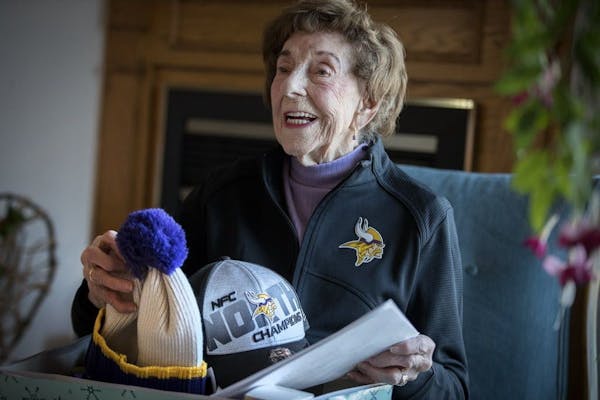The Vikings' three-day mandatory minicamp, which runs from Tuesday to Thursday, caps the team's offseason program with its final on-field work before training camp next month.
Many of the questions that exist about this year's team aren't likely to be resolved this week, though.
The Vikings are still sorting through major changes in their secondary after a dismal 2020 season, and their configuration along both lines of scrimmage must be sorted out. Several key players might not be on the field this week, further clouding whatever picture of the 2021 Vikings the minicamp might provide.
Before practices begin on Tuesday, here is a look at several of the major story lines surrounding the Vikings as they head into minicamp.
1. When will the Vikings see Danielle Hunter?
In a bit of a turnabout from where the defensive end has been this spring, Hunter is in Minnesota this week.
Vikings defensive end Danielle Hunter completed a medical check at the team's facility Monday and will be with the team for the start of minicamp Tuesday after he agreed to a reworked contract. Hunter had skipped all of the team's voluntary offseason workouts. Hunter had a $100,000 workout bonus in his deal, and could have been fined more than $93,000 had he skipped this week's camp.
The five-year, $72 million deal he signed in 2018 made Hunter — who reached 50 sacks sooner than any player in NFL history — the 17th highest-paid edge rusher in the league, but the fact he has three years remaining on his current deal and he is returning from surgery on a herniated disc in his neck complicated his negotiating position. The Vikings have always thought highly of Hunter, though, and a source said last fall they had little interest in getting into a contract standoff with a player they regarded as a model citizen on and off the field.
2. How will the Vikings' secondary look?
After coach Mike Zimmer's admissions that he misjudged the 2020 roster, the Vikings have addressed their secondary with a series of moves that suggest he's not interested in having that happen again. Bashaud Breeland didn't practice during an open OTA on Wednesday while he recovered from offseason shoulder surgery, but the deal the Vikings gave him (worth $3 million with $2 million guaranteed) would suggest they think the veteran can start this year. In fact, it's possible the Vikings could prominently feature as many as four offseason pickups (Breeland, Patrick Peterson, Mackensie Alexander and Xavier Woods) next to Harrison Smith in their defense this fall.
Second-year man Cameron Dantzler will have to show he can stay healthy, while 2020 first-round pick Jeff Gladney hasn't been with the Vikings all spring following his April arrest on a family violence assault charge. The Vikings' moves seem to imply they're not content merely waiting for last year's rookies to assert themselves, and their secondary competition will be worth watching both this week and through training camp later this summer.
3. Will the offensive line start to take shape?
The Vikings have made no secret of the fact they want first-round pick Christian Darrisaw to be their left tackle, but he's been limited to individual drills during OTAs after having core muscle surgery before the draft. The Vikings also haven't given third-round pick Wyatt Davis first-team work during the OTAs open to reporters, sticking with Dakota Dozier at right guard while moving Ezra Cleveland to the left side. The two rookies figure to receive every chance to prove they can start, and particularly with Darrisaw, it's worth watching whether anything changes this week, since any increase in team work would suggest the Vikings are reducing his limitations after surgery.
4. What's next for Kellen Mond?
Mond got one first-team snap in a 7-on-7 drill during last week's open OTA, but has mostly worked behind Nate Stanley and Jake Browning during full-team periods, as the Vikings continue to introduce their third-round pick to the offense. Quarterback Kirk Cousins said last week that Mond has picked things up quickly, though he related it to his own experience as a rookie QB nearly a decade ago.
"I think the big piece right now, and I lived it back in 2012, is just being able to take in the volume of offense that's thrown at you," Cousins said last week. "The terminology is likely new, the plays at times are likely new, so processing that volume, taking in that volume to where you can go out and play off instinct and not have to be thinking, is really … where he's focused."
![Minnesota Vikings offensive tackle Brian O'Neill (75) eyed linebacker Cameron Smith (32) during Wednesday's offseason workout. ] ANTHONY SOUFFLE • a](https://arc.stimg.co/startribunemedia/6BLDSMCECGGSGB4353EDCJNF5E.jpg?fit=crop&crop=faces&w=550&&auto=format)

